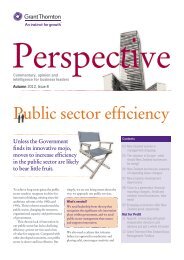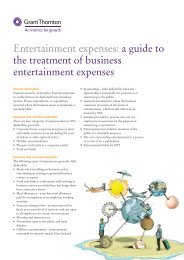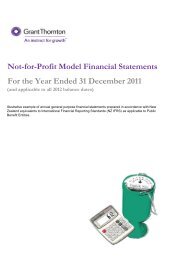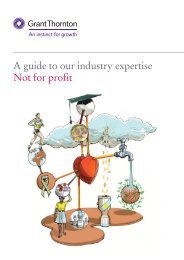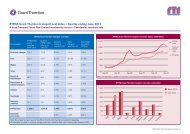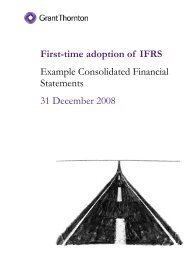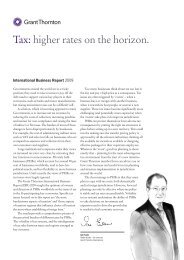Preparing for global lease accounting standards - Grant Thornton ...
Preparing for global lease accounting standards - Grant Thornton ...
Preparing for global lease accounting standards - Grant Thornton ...
You also want an ePaper? Increase the reach of your titles
YUMPU automatically turns print PDFs into web optimized ePapers that Google loves.
Buy rather than <strong>lease</strong><br />
Working with lenders<br />
Real estate executives do not believe<br />
the new <strong>standards</strong> will significantly<br />
<strong>for</strong>ce lessees to consider buying space<br />
rather than leasing, saying they will<br />
remember the reasons they are<br />
choosing to be tenants in the first place.<br />
“Generally, lessees will <strong>lease</strong> space<br />
because they will rather put their cash<br />
into their business rather than tying it<br />
up in real estate,” said Redcliff Realty’s<br />
D’Ercole. “They understand their<br />
business, they don’t generally<br />
understand real estate.”<br />
“In the property space, buying<br />
would generally not be an option<br />
available to most tenants due to the<br />
current ownership structure of how<br />
assets are held and traded, which does<br />
not lend itself to the smaller space<br />
requirements of the majority of our<br />
tenants,” said an Australian executive.<br />
“We expect that tenants’ current criteria<br />
will continue to drive decision-making,<br />
such as cash flow, taxation impact<br />
and length of tenure, availability<br />
of suitable space, and flexibility<br />
on expiry of term.”<br />
“Although the impact on tenants’<br />
gearing [ratio of long-term debt<br />
compared to its equity capital] is<br />
broadly the same whether <strong>lease</strong>d or<br />
bought, we see liquidity issues and<br />
operational focus as likely to dictate<br />
tenant behaviour: ie, so leasing is still<br />
attractive,” said Bell. “However, the<br />
balance sheet disclosure benefits of<br />
sale and <strong>lease</strong>-back transactions will<br />
disappear, making them less attractive<br />
to potential tenants going <strong>for</strong>ward.”<br />
From the lessee side, Australia’s<br />
Harvey Ross believes there could be a<br />
trend toward buying. “One of the big<br />
issues that we have here, as I suspect<br />
you have everywhere else, is the lack of<br />
available funds <strong>for</strong> development coming<br />
through the normal banking industry.<br />
One of the opportunities that this offers<br />
the occupiers is the ability to use any<br />
available cash flow or the bank balance<br />
as the funding <strong>for</strong> new developments.<br />
Again, this has a couple of derivatives.<br />
Not only does it mean that the ratio<br />
of <strong>lease</strong>-to-own may well change, it<br />
also means that corporations—major<br />
occupiers—may take short-term profit<br />
out of funding a new development, and<br />
then doing a sale <strong>lease</strong>-back at some<br />
stage beyond the changeover in the<br />
<strong>accounting</strong> <strong>standards</strong>.”<br />
Lenders are gradually becoming aware<br />
of the proposed <strong>lease</strong> <strong>accounting</strong><br />
<strong>standards</strong>, given that the balance sheets<br />
of their clients may change as more<br />
<strong>lease</strong>s become liabilities and assets.<br />
Some lessors have discussed the change<br />
with lenders—including potential<br />
revisions to loan covenants and capital<br />
structures—but there was no consensus<br />
on how lenders would react.<br />
An Australian real estate executive<br />
said that his firm is comparing the issue<br />
to the adoption of IFRS in Australia,<br />
with an emphasis on ongoing dialogue<br />
with financiers, customers, and<br />
investors. “Whilst many existing<br />
covenants either already seek to<br />
include impacts from contracted <strong>lease</strong><br />
arrangements and/or provide <strong>for</strong><br />
adjustments relating to changes in<br />
<strong>accounting</strong> <strong>standards</strong>, there will be<br />
continued discussions with financiers<br />
as the adoption date gets closer and<br />
we have clearer guidance on the final<br />
<strong>for</strong>m of the new standard.”<br />
Behringer Harvard’s Garfield said<br />
he sees, based on the ED, potential <strong>for</strong><br />
significant change with lenders and the<br />
perspective of the industry by lenders:<br />
“Real estate has a conventional view<br />
of how it’s analysed. Revenue and net<br />
operating income are fundamental<br />
characteristics of real estate. If the<br />
exposure draft is incorporated into<br />
literature, that will be dramatically<br />
changed and, in essence, will change<br />
our business model, at least as it’s<br />
reported, from what has traditionally<br />
been a rental perspective to a financial<br />
model, and interest income will be<br />
a dramatic part of that. And as a<br />
consequence of that, the timing of<br />
revenues will be dramatically changed<br />
since now, from a lessor perspective,<br />
it’s now weighted more to the front<br />
end. There’ll be more interest income<br />
in the early years of a <strong>lease</strong> vs. the end.<br />
The incorporation of what we kind of<br />
call the ‘service aspect’—and, again,<br />
per the exposure draft—to have to try<br />
to incorporate that over the life of the<br />
<strong>lease</strong> will dramatically change and, in<br />
my view, distort the true economics<br />
of real estate.”<br />
Telereal’s Persky imagines that<br />
lenders might “read something into”<br />
changes on the balance sheet, with<br />
potential negative impact. He’s also<br />
curious about the effect on financial<br />
institutions themselves. “The banks<br />
are now holding on to lots of property.<br />
And a lot of them have got a little bit<br />
of property, and they <strong>lease</strong> out their<br />
own use properties if they’re a retail<br />
bank. One wonders how that might<br />
be accounted <strong>for</strong>, because banks, more<br />
than anyone, are worried about their<br />
balance sheet.”<br />
“We found the lenders didn’t really<br />
know about the potential standard<br />
or what impact it would have,”<br />
said Bradshaw in the United States.<br />
“So explaining to them the changes it<br />
would make to the balance sheet was<br />
somewhat surprising to them. But they<br />
didn’t have any immediate concern—<br />
at least the lenders we were dealing<br />
with. Of course, we’re a real estate<br />
company, so they have concerns<br />
more now over value of the assets<br />
and things like that than they do<br />
true balance-sheet covenants.”<br />
“We found the lenders<br />
didn’t really know about<br />
the potential standard<br />
or what impact it<br />
would have.”<br />
Terry Bradshaw,<br />
Executive VP and Chief Financial Officer<br />
of American Asset Corp.<br />
12 13



